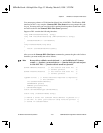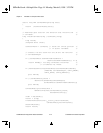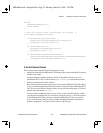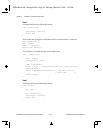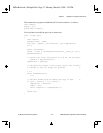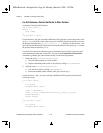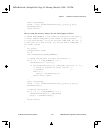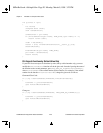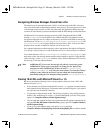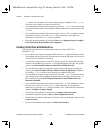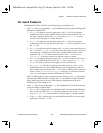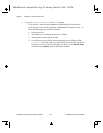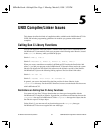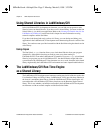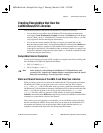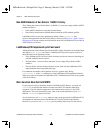
Chapter 4 Windows 3.1 Compiler/Linker Issues
©
National Instruments Corporation 4-21 LabWindows/CVI Programmer Reference Manual
Recognizing Windows Messages Passed from a DLL
The normal way of communicating with a DLL is to call functions in the DLL. However,
cases exist where other communication methods are necessary. The most typical case is that
of an interrupt service routine in a DLL that must notify the application that the interrupt
occurred. In cases like this, you must communicate with the DLL through a callback function.
LabWindows/CVI recognizes messages posted by a DLL through the Windows SDK
function
PostMessage, and can initiate a user callback function. This method is useful
for hardware interrupts, but it is subject to the latency associated with Windows messaging.
LabWindows/CVI uses
RegisterWinMsgCallback, UnRegisterWinMsgCallback, and
GetCVIWindowHandle to recognize Windows messages from a DLL. You can call these
functions from a module compiled in Watcom or from source code.
For complete information on these functions, refer to the function descriptions in Chapter 4,
User Interface Library Reference, of the LabWindows/CVI User Interface Reference Manual.
To use these functions, call
RegisterWinMsgCallback and GetCVIWindowHandle. Pass
their return values, the message number and the window handle, to the DLL. When the DLL
sends a message, it calls
PostMessage with these values. When LabWindows/CVI receives
the message, it calls the callback function.
Note
LabWindows/CVI can receive the message only when it is processing events.
LabWindows/CVI processes events when it is waiting for user input. If the
program you run in LabWindows/CVI does not call
RunUserInterface,
GetUserEvent, or scanf, or if it does not return from a User Interface Library
callback, events will not be processed. You can remedy this in the program by
periodically calling the User Interface Library function
ProcessSystemEvents.
Creating 16-bit DLLs with Microsoft Visual C++ 1.5
Be sure to consider the following issues or project options when you create a DLL with
Microsoft Visual C++ 1.5:
• Every function you call from outside the DLL must be
far, exported, and must load the
data segment into the DS register. The function must load the DS register if you want to
use any non-local variables in a function.
• Use the large or huge memory model. The savings you gain by using smaller memory
models is not worth having to use the
far keyword throughout your code. This project
option is in Compiler»Memory Model»Segment Setup.
• You can make the compiler load the data segment into the DS register automatically by
using the SS!=DS, DS loaded on function entry project option in Compiler»Memory
Model»Segment Setup.
• If you try to use the optimize entry code option (
/GD), by selecting
Compiler»Windows»Prolog/Epilog»Generate Prolog/Epilog For, it conflicts with the
00ProRef.book : 06chap04.fm Page 21 Monday, March 9, 1998 3:23 PM



